Healthy Hair Tips
Are you struggling with dull, lifeless hair that refuses to grow? Essential oils might be the secret weapon you’ve been searching for. In this guide, we’ll explore the top essential oils for promoting long, vibrant hair and show you how to incorporate them into your hair care routine. You’ll learn about DIY treatments, safety measures, and complementary tips to maximize your results. Discover how natural ingredients like coconut oil and vitamin E can work wonders for your hair and scalp health, while also benefiting your skin and diet.
Key Takeaways
- Essential oils can promote hair growth, nourish the scalp, and reduce stress through aromatherapy
- Proper dilution and application techniques are crucial for safe and effective use of essential oils
- DIY treatments like hair masks and hot oil treatments can enhance the benefits of essential oils
- A balanced diet and regular trims complement essential oil use for optimal hair health
- Consult professionals and conduct patch tests to ensure safety when using essential oils for hair care
Understanding Essential Oils and Their Impact on Hair Health
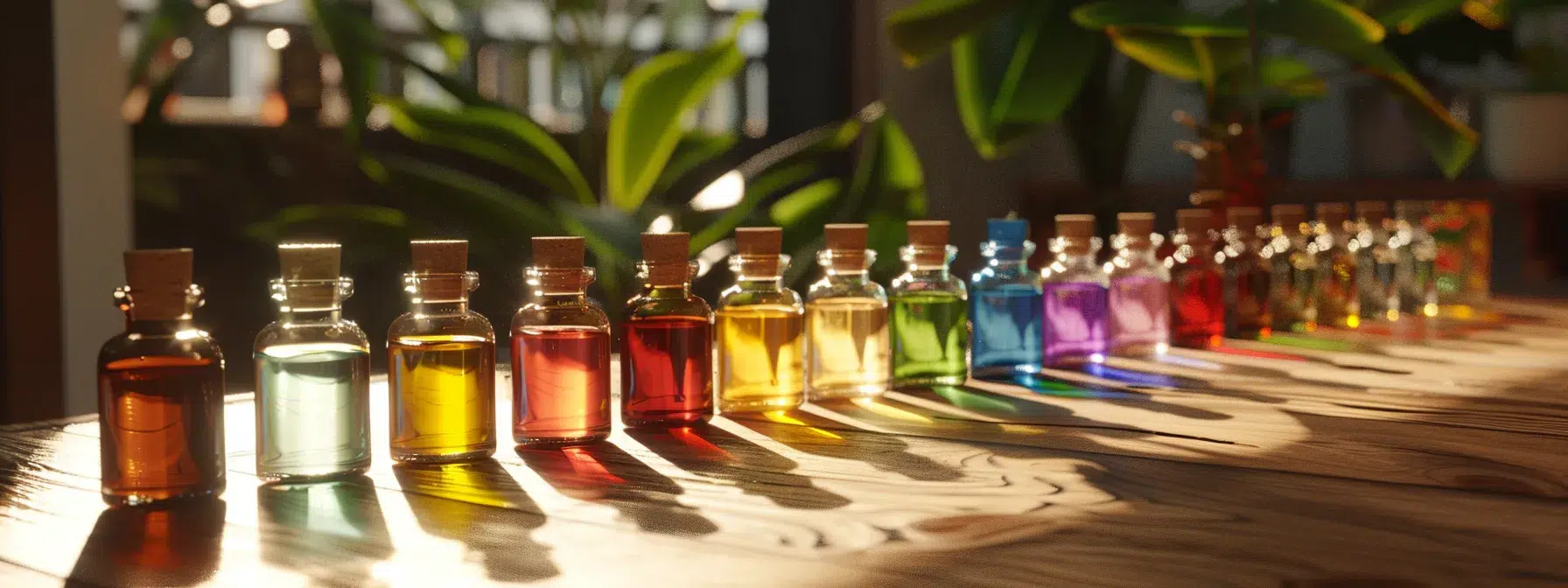
Essential oils offer numerous benefits for your hair health, from promoting growth to nourishing your scalp and follicles. They can also reduce hair stress through aromatherapy. By understanding how these oils work, you’ll be better equipped to choose the right ones for your specific hair needs, whether you’re dealing with friction from your pillow, water damage, or conditions like psoriasis. Let’s explore how essential oils can transform your hair care routine.
Recognizing the Benefits of Essential Oils for Hair Growth
Essential oils can be a game-changer for your hair health, promoting growth and nourishing your scalp. You’ll find that incorporating these natural extracts into your hair care routine can boost circulation, stimulate follicles, and provide vital nutrients. Just as exercise and a balanced diet with vitamins support overall health, essential oils offer targeted benefits for your hair. Remember to dilute them properly and avoid using harsh chemicals like bleach alongside these oils to maximize their effectiveness. For best results, apply the oils to your scalp using a gentle massage technique, perhaps using a soft cotton cloth to distribute them evenly.
How Essential Oils Nourish the Scalp and Hair Follicles
Essential oils nourish your scalp and hair follicles by penetrating deep into the skin, providing vital nutrients, and promoting a healthy environment for hair growth. When you apply these oils, you’re not just treating your hair but also caring for your scalp, which is crucial for addressing issues like dandruff and promoting overall hair health. As part of your skincare routine, essential oils can help balance oil production, soothe irritation, and even fight fungal infections that might be hindering your hair’s growth. Whether you’re preparing your hair for a braid or addressing persistent scalp issues, incorporating essential oils into your cosmetology-inspired hair care regimen can make a significant difference.
The Role of Aromatherapy in Reducing Hair Stress
Aromatherapy can play a significant role in reducing hair stress, which can impact your overall hair health and hairstyle. When you incorporate essential oils into your hair care routine, you’re not just nourishing your hair but also benefiting from their calming properties. As you gently comb through your hair with a microfiber towel after washing, try adding a few drops of lavender or chamomile oil to promote relaxation. These soothing scents can help reduce stress levels, which may contribute to issues like hair loss or slow growth. While aromatherapy isn’t a substitute for dermatology treatments or biotin supplements, it can be a valuable addition to your holistic approach to hair care.
We’ve explored the power of essential oils for hair. Now, let’s dive into the best ones for your hair.
Top Essential Oils for Achieving Long, Vibrant Hair
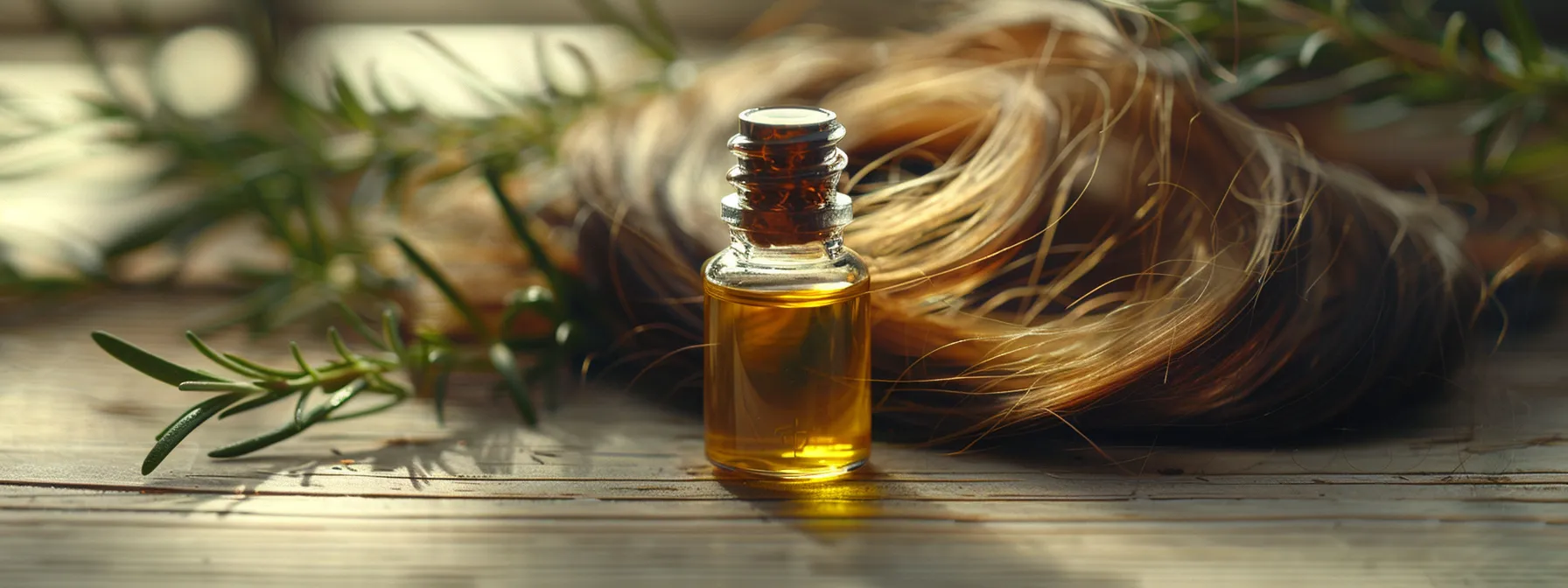
Discover the top essential oils for achieving long, vibrant hair. From rosemary’s stimulating effects to lavender’s growth-promoting properties, these oils can transform your hair care routine. Learn how peppermint strengthens hair, tea tree combats scalp issues, and ylang-ylang moisturizes dry strands. Incorporate these oils into your shower routine to hydrate and nourish your hair, boosting protein and iron for healthier hair.
Harnessing the Power of Rosemary Oil for Hair Stimulation
Rosemary oil is a powerhouse for stimulating hair growth and combating hair loss. You can easily incorporate it into your hair care routine by adding a few drops to your shampoo or mixing it with a carrier oil for a scalp massage. After washing, gently pat your hair dry with a soft towel to avoid damage. If you’re dealing with thinning bangs, applying diluted rosemary oil to your hairline can help stimulate growth. This essential oil works by improving blood circulation to the scalp and balancing pH levels, which may help prevent excess acidity that can harm hair follicles.
- Add rosemary oil to your shampoo
- Mix with carrier oil for scalp massage
- Use on hairline for thinning bangs
- Improves blood circulation
- Balances scalp pH
Utilizing Lavender Oil to Promote Healthy Hair Growth
Lavender oil is a versatile addition to your hair care routine, promoting healthy growth and adding moisture to your hair. You can incorporate it into your regimen by adding a few drops to your shampoo or conditioner or mixing it with avocado oil for a nourishing hair mask. When you’re styling your hair in a bun, apply a small amount of diluted lavender oil to your scalp for added benefits. Remember, while essential oils can support hair health, maintaining a healthy diet is equally important for vibrant hair. Here’s how you can use lavender oil effectively:
- Add to shampoo or conditioner
- Mix with avocado oil for a hair mask
- Apply to the scalp when styling in a bun
- Use as part of a balanced hair care routine
- Combine with a healthy diet for the best results
Strengthening Hair With Peppermint Oil
Peppermint oil can be a game-changer for strengthening your hair from root to tip. When you’re aiming for long, luscious hair, try massaging diluted peppermint oil into your scalp before brushing your hair. This invigorating oil stimulates blood flow, which can promote healthier hair growth. For those who love a sleek ponytail, apply a small amount of peppermint oil to your hairline to help prevent breakage. If you’re worried about frizz, consider swapping your cotton pillowcase for a silk one and adding a drop of peppermint oil to your leave-in conditioner for extra smoothness:
- Massage diluted peppermint oil into the scalp
- Apply to the hairline for ponytail protection
- Add a drop to leave-in conditioner
- Use with a silk pillowcase for frizz control
- Brush gently after application for even distribution
Combating Scalp Issues With Tea Tree Oil
Tea tree oil can be your secret weapon against scalp issues, helping you combat dandruff and reduce stress-related hair problems. When you’re dealing with an itchy or flaky scalp, try adding a few drops of tea tree oil to your shampoo or dry shampoo. You can also mix it with a carrier oil and apply it directly to your scalp using a soft-bristled hairbrush for even distribution. This powerful essential oil’s antifungal and antibacterial properties make it effective in maintaining a healthy scalp environment, which is crucial for growing long, vibrant hair.
Moisturizing Dry Hair Using Ylang-Ylang Oil
Ylang-ylang oil can be your savior for dry, frizzy hair. When you’re battling dryness and looking to add shine, try mixing a few drops of ylang-ylang oil with your favorite hair mask. This essential oil helps balance sebum production, making it great for both dry and oily hair types. If you’re worried about your color-treated hair, ylang-ylang can help lock in moisture without stripping away your vibrant hue. Here’s how to incorporate ylang ylang oil into your hair care routine:
- Add to hair masks for deep conditioning
- Mix with leave-in conditioner for daily use
- Apply to ends to combat frizz
- Use as a pre-shampoo treatment for extra moisture
- Combine with argan oil for a nourishing scalp massage
Essential oils can transform your hair. Now, let’s put them to work.
Incorporating Essential Oils Into Your Hair Care Routine
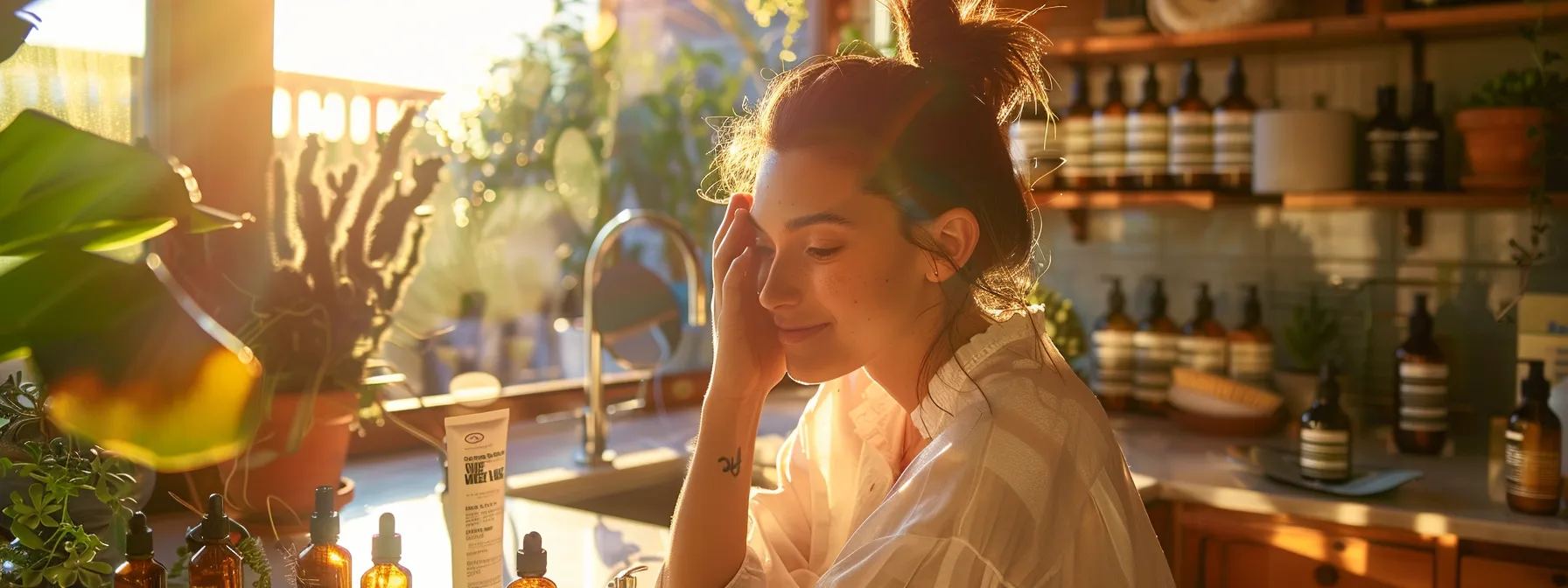
Ready to elevate your hair care routine with essential oils? Learn how to prepare effective blends, safely dilute oils for topical use, master scalp massage techniques, and enhance your shampoos and conditioners. These simple steps will help you harness the power of essential oils for healthier, more vibrant hair.
Preparing Essential Oil Blends for Hair Applications
Preparing essential oil blends for your hair is simple and rewarding. Start by choosing a carrier oil like jojoba or argan, then add a few drops of your favorite essential oils. You can create a custom blend tailored to your hair’s needs, such as combining lavender for growth, peppermint for scalp stimulation, and ylang-ylang for moisture. Remember to always dilute your essential oils properly to avoid skin irritation. Experiment with different combinations to find what works best for your hair type and goals.
Safe Dilution Practices for Topical Use
When using essential oils on your hair and scalp, proper dilution is crucial for safety and effectiveness. You’ll want to mix your chosen essential oils with a carrier oil like coconut or jojoba at a ratio of about 2-3 drops of essential oil per teaspoon of carrier oil. This dilution helps prevent skin irritation and ensures even distribution of the oils. Remember, everyone’s skin sensitivity is different, so start with a lower concentration and adjust as needed.
Techniques for Scalp Massage With Essential Oils
When incorporating essential oils into your hair care routine, mastering scalp massage techniques can amplify their benefits. Start by warming a small amount of your diluted essential oil blend in your palms. Using your fingertips, apply gentle pressure in circular motions across your scalp, focusing on areas that need attention. This technique not only helps distribute the oils evenly but also stimulates blood flow, promoting healthier hair growth. For best results, perform your scalp massage before bed or during your shower routine:
- Warm oil blend in palms
- Use fingertips for circular motions
- Focus on problem areas
- Massage before bed or in the shower
- Stimulate blood flow for growth
Enhancing Shampoos and Conditioners With Essential Oils
Enhancing your shampoos and conditioners with essential oils is a simple way to boost your hair care routine. Add 2-3 drops of your chosen essential oil to a palm-sized amount of shampoo or conditioner before use. For dry hair, try adding ylang-ylang or lavender oil to your conditioner. If you’re dealing with an oily scalp, peppermint or tea tree oil in your shampoo can help balance sebum production. Remember to mix well before applying to your hair:
Essential oils pack a punch in your hair care routine. Now, let’s roll up our sleeves and craft some DIY treatments.
DIY Treatments With Essential Oils for Hair Enhancement
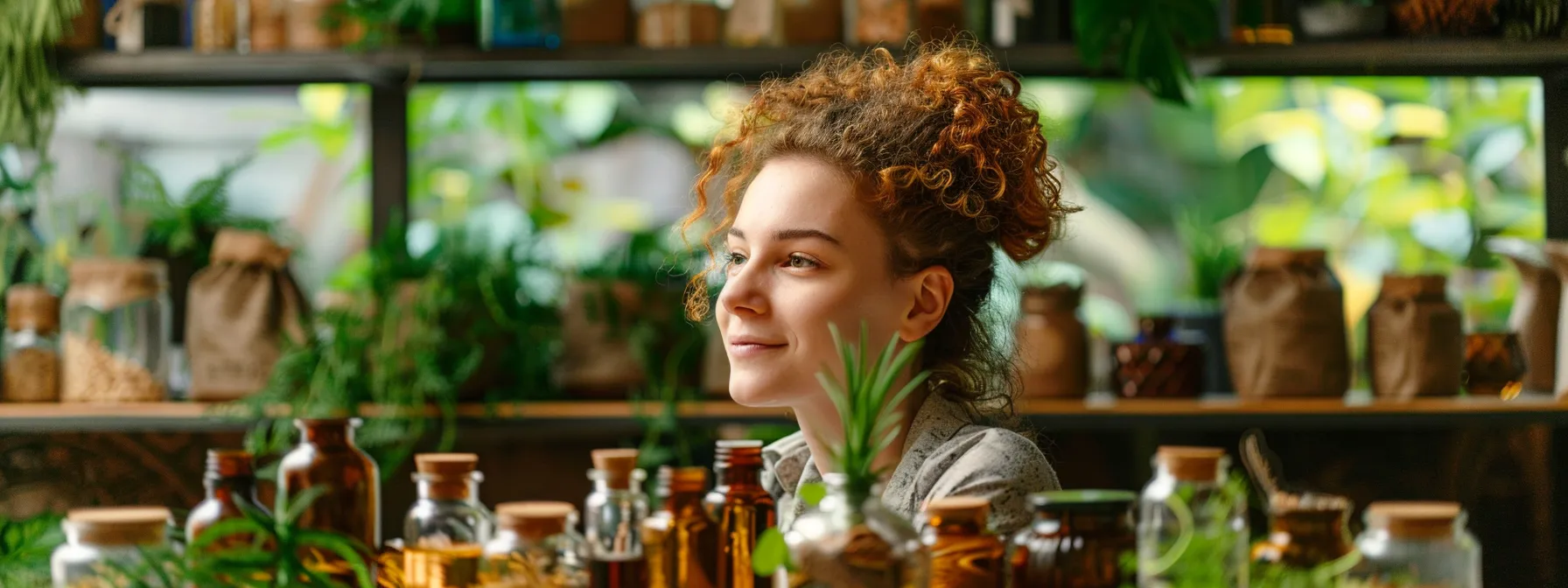
Discover how to enhance your hair with DIY essential oil treatments. Learn to craft a nourishing hair mask, create a revitalizing hot oil treatment, formulate a leave-in conditioner, and develop a hair growth serum. These easy-to-make solutions use natural ingredients to promote healthy, vibrant hair. Try these home remedies to address your specific hair concerns and achieve salon-worthy results.
Crafting a Nourishing Hair Mask at Home
Crafting a nourishing hair mask at home is a great way to pamper your hair with essential oils. You can create a simple yet effective mask by mixing 2 tablespoons of coconut oil with 5 drops each of lavender and rosemary essential oils. Apply this mixture to your hair, focusing on the ends, and leave it on for 30 minutes before shampooing as usual. This DIY treatment will help moisturize your hair, promote growth, and leave it feeling soft and shiny.
Creating a Revitalizing Hot Oil Treatment
You can create a revitalizing hot oil treatment at home to nourish your hair and promote growth. Start by warming 2 tablespoons of coconut oil in a microwave-safe bowl. Add 3 drops each of rosemary and peppermint essential oils, then mix well. Apply the warm mixture to your hair, focusing on the scalp and ends. Wrap your hair in a warm towel and leave the treatment on for 30 minutes before shampooing as usual. This DIY treatment will help strengthen your hair and add shine:
Formulating a Leave-in Conditioner With Natural Ingredients
You can easily formulate a leave-in conditioner with natural ingredients and essential oils at home. Start with a base of aloe vera gel and add a few drops of your favorite essential oils, such as lavender for growth or ylang-ylang for moisture. Mix in a small amount of argan oil for extra nourishment, and store your DIY leave-in conditioner in a spray bottle for easy application. Use this after washing your hair to keep it soft, manageable, and protected throughout the day:
- Combine aloe vera gel with essential oils
- Add argan oil for extra nourishment
- Store in a spray bottle
- Apply after washing hair
- Protects and moisturizes throughout the day
Developing a Hair Growth Serum Using Essential Oils
You can easily develop a hair growth serum using essential oils at home. Start with a base of castor oil, known for its hair-strengthening properties, and add 3 drops each of rosemary and peppermint essential oils. Mix in a few drops of vitamin E oil for added nourishment. Apply this serum to your scalp a few times a week, gently massaging it in to stimulate blood flow. With consistent use, you may notice improved hair thickness and growth over time.
Essential oils work wonders for hair. But there’s more to great hair than oils alone.
Maximizing Results With Complementary Hair Care Tips
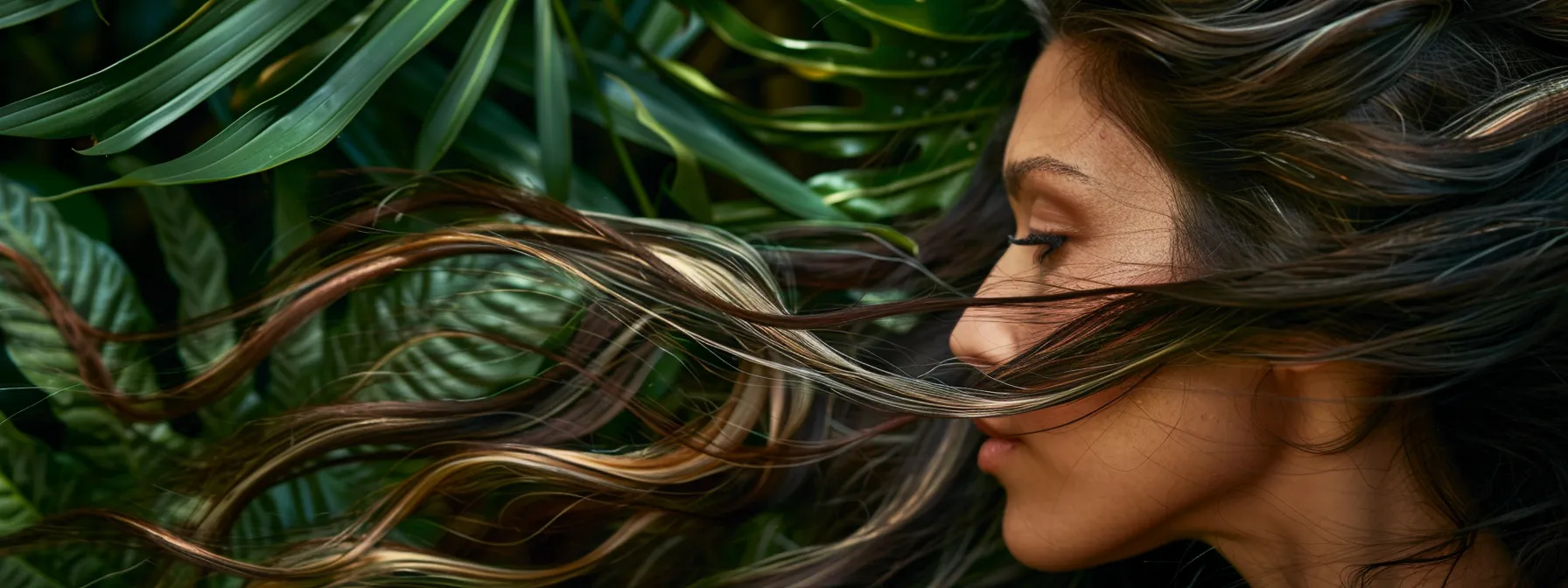
To maximize the benefits of essential oils for your hair, consider these complementary tips. Maintain a balanced diet for optimal hair health, protect your hair from environmental damage, and trim regularly to encourage growth. Choose hair products that work well with essential oils to enhance their effects. These simple steps can help you achieve longer, more vibrant hair.
Maintaining a Balanced Diet for Optimal Hair Health
You can boost the effectiveness of essential oils for your hair by maintaining a balanced diet. Focus on consuming foods rich in vitamins A, C, and E, as well as biotin and omega-3 fatty acids. These nutrients support healthy hair growth and strength from within. Include plenty of lean proteins, leafy greens, and fruits in your meals to provide your hair with the building blocks it needs to thrive. Remember, what you eat plays a crucial role in your hair’s health, so complement your essential oil treatments with a nutrient-rich diet for optimal results.
Protecting Hair From Environmental Damage
Protecting your hair from environmental damage is crucial when using essential oils for hair health. You can shield your hair by wearing a hat or scarf when outdoors, especially on sunny or windy days. Try using a leave-in conditioner with UV protection before heading out, and consider applying a small amount of argan oil to your hair ends to prevent dryness and breakage. Remember to rinse your hair after swimming in chlorinated or salt water to remove any harmful residues.
Regular Trimming to Encourage Growth
Regular trimming is essential for encouraging hair growth and maintaining healthy hair. You should aim to trim your hair every 6-8 weeks to remove split ends and prevent breakage, which can hinder length retention. When you combine regular trims with your essential oil treatments, you’ll create the ideal environment for your hair to grow longer and stronger. Remember, a small trim goes a long way in keeping your hair looking vibrant and healthy.
Choosing Hair Products That Complement Essential Oils
When choosing hair products to complement your essential oil treatments, opt for gentle, sulfate-free formulas that won’t strip your hair of its natural oils. Look for shampoos and conditioners that contain natural ingredients like aloe vera or coconut oil, which work well with essential oils. You can also consider products specifically designed to address your hair concerns, such as volumizing or moisturizing options. Remember to avoid harsh chemicals that may interfere with the benefits of your essential oil treatments:
- Choose sulfate-free shampoos and conditioners
- Look for products with natural ingredients
- Select formulas that address your specific hair concerns
- Avoid harsh chemicals that may counteract essential oil benefits
- Consider using leave-in treatments that complement your oil regimen
The power of essential oils goes beyond their scent. But with great power comes the need for caution and care.
Safety Measures and Considerations When Using Essential Oils

When using essential oils for hair care, safety should be your top priority. Learn to identify potential allergens and conduct patch tests to avoid reactions. Understand proper storage and shelf life to maintain oil quality. Consult professionals for personalized advice tailored to your needs. Avoid common mistakes in application to maximize benefits and minimize risks.
Identifying Potential Allergens and Conducting Patch Tests
Before using essential oils on your hair, it’s crucial to identify potential allergens and conduct patch tests. You can do this by applying a small amount of diluted essential oil to the inside of your wrist or behind your ear. Wait 24 hours to see if any irritation occurs. If you experience redness, itching, or swelling, avoid using that oil. Remember, even natural products can cause reactions, so always prioritize safety when trying new hair treatments.
Understanding Proper Storage and Shelf Life of Oils
To ensure your essential oils remain effective for hair care, proper storage is crucial. Keep your oils in dark glass bottles away from direct sunlight and heat, as these factors can degrade their quality. Store them in a cool, dry place, ideally below 70°F (21°C). Most essential oils have a shelf life of 1-2 years when stored correctly, but citrus oils may degrade faster. Always check for any changes in color, consistency, or scent before use, as these can indicate that the oil has expired:
- Use dark glass bottles for storage
- Keep away from sunlight and heat
- Store in cool, dry place
- Check for quality changes before use
- Replace oils after 1-2 years
Consulting Professionals for Personalized Advice
When using essential oils for hair care, it’s wise to consult professionals for personalized advice. You can schedule an appointment with a trichologist or dermatologist who specializes in hair and scalp health. These experts can assess your specific needs and recommend the best essential oils for your hair type and concerns. They may also provide guidance on proper dilution ratios and application techniques to maximize benefits while minimizing risks. Remember, professional advice can help you avoid potential issues and achieve the best results for your hair:
Avoiding Common Mistakes in Essential Oil Application
When applying essential oils to your hair, avoid common mistakes that can hinder their effectiveness. Don’t use undiluted oils directly on your scalp, as this can cause irritation. Instead, always mix them with carrier oil. Be careful not to overuse oils, as this can lead to greasy hair or scalp buildup. Start with a small amount and adjust as needed. Remember to patch-test new oils before full application to prevent allergic reactions.
Enhancing Your Hair Health at The Color Studio and Salon
As you explore the benefits of essential oils for hair care and learn how these natural remedies can boost your hair health, consider enhancing your routine with expert help. At The Color Studio and Salon, our professionals specialize in integrating both traditional and advanced hair care techniques to optimize your hair’s health. Trust us to incorporate essential oils effectively into your hair regimen, ensuring your hair is nourished and vibrant. Embrace these natural solutions and let us guide you to achieving the beautiful, healthy hair you desire.




